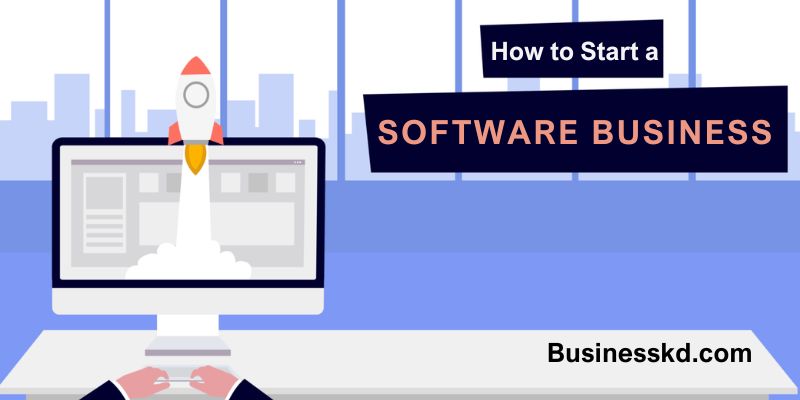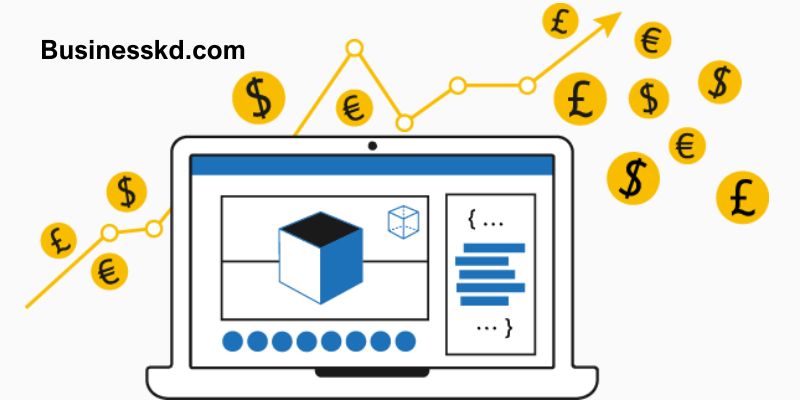Starting a software business is an exciting venture that requires careful planning and execution. In this comprehensive guide, Businesskd will walk you through the essential steps on how to start a software business ideas. From defining your niche to continuous improvement, each step plays a crucial role in building a solid foundation for your software venture.
How to Start a Software Business
1. Define Your Niche and Value Proposition
The first step in learning how to start a software business is defining your niche and value proposition. Identify a specific market or industry that aligns with your expertise and interests. Consider the problems existing in that niche and how your software can provide a solution. Clearly articulate the unique value your software brings to the table, differentiating it from existing solutions in the market.

2. Market Research
Before diving into development, conduct thorough market research to understand your target audience and competition. Identify potential customers, their needs, and the challenges they face. Analyze the strengths and weaknesses of existing solutions in your chosen niche. This information will help you refine your software idea and position it effectively in the market.
3. Create a Business Plan
A well-crafted business plan is essential for guiding your software business. Outline your goals, target market, revenue model, and marketing strategy. Include financial projections to attract potential investors or secure funding. The business plan serves as a roadmap, helping you stay focused on your objectives as your software business evolves.
4. Legal Structure and Registration
Choose a legal structure for your business, such as a sole proprietorship, LLC, or corporation. Register your business with the appropriate government authorities to ensure compliance with local regulations. This step lays the groundwork for the legal framework of your software business.

5. Intellectual Property Protection
Protecting your intellectual property is crucial in the software industry. Consider filing for patents, trademarks, or copyrights to safeguard your software and brand. Additionally, ensure you have the proper licenses for any third-party tools or software components you integrate into your product.
6. Develop Your Software
Assemble a skilled development team or hire freelancers with expertise in your chosen technology stack. Follow agile development methodologies to maintain flexibility and adaptability throughout the development process. Thoroughly test your software to ensure quality and usability before moving on to the next steps.
7. Create a Minimum Viable Product (MVP)
To validate your software concept, develop a Minimum Viable Product (MVP) with essential features. The MVP allows you to launch quickly, gather user feedback, and make informed improvements based on real user experiences. This iterative approach ensures that your final product meets the actual needs of your target audience.
8. Marketing and Branding
Establishing a strong brand identity is crucial for the success of your software business. Develop a compelling marketing strategy that includes an online presence, content marketing, and social media. Clearly communicate your value proposition to potential customers, emphasizing how your software addresses their pain points.
9. Sales and Distribution
Choose a sales model that aligns with your target market, whether it’s direct sales, partnerships, online sales, or a combination. Establish distribution channels and partnerships to reach your audience effectively. A well-thought-out sales and distribution strategy is essential for the commercial success of your software.
10. Customer Support
Set up robust customer support channels to address user issues and feedback promptly. Use customer feedback as a valuable resource for continuous improvement. Building a positive relationship with your users enhances their experience and increases the likelihood of customer loyalty and positive word-of-mouth.
11. Monetization Strategy
Determine your monetization strategy, considering factors such as pricing models (subscription, one-time purchase, freemium, etc.) and value-based pricing. Be open to adjusting your pricing strategy based on market feedback and competitive analysis. A well-defined monetization strategy is crucial for sustaining and growing your software business.
12. Financial Management
Establish a solid financial management system to track your expenses, revenue, and cash flow. Regularly monitor your financial metrics to make informed decisions and ensure the financial health of your software business. Proper financial management is essential for long-term sustainability and growth.
13. Compliance and Regulations
Ensure that your software complies with relevant regulations and industry standards. Stay informed about changes in data protection and privacy laws to avoid legal issues. Adhering to compliance and regulations builds trust with your customers and enhances the credibility of your software business.
14. Scale and Expand
As your software business grows, scale your operations accordingly. Explore opportunities for expansion, both in terms of features and markets. Scaling requires strategic planning and careful execution to maintain the quality and effectiveness of your software.
15. Continuous Improvement
Stay updated on industry trends and technology advancements to remain competitive. Use feedback from users and market trends to continuously improve your software. Embrace a mindset of continuous improvement, ensuring that your software evolves to meet the changing needs of your audience.
16. Networking and Partnerships
Build a network within your industry by attending events and conferences. Establish partnerships with other businesses or organizations that complement your software. Networking and partnerships can open doors to new opportunities, collaborations, and market insights.
17. Funding
Explore various funding options, such as bootstrapping, seeking angel investors, pursuing venture capital, or applying for government grants. The right funding strategy depends on your business model, goals, and growth plans. Adequate funding is crucial for development, marketing, and scaling your software business.
18. Adaptability
Be flexible and ready to adapt to changes in the market or technology landscape. The software industry is dynamic, and the ability to pivot or adjust your strategy based on emerging trends is key to long-term success. Embrace innovation and be proactive in staying ahead of the curve.
Conclusion
In conclusion, learning how to start a software business involves a combination of strategic planning, execution, and adaptability. By following these comprehensive steps, you can lay a solid foundation for your software venture and increase the likelihood of success in a competitive market.


